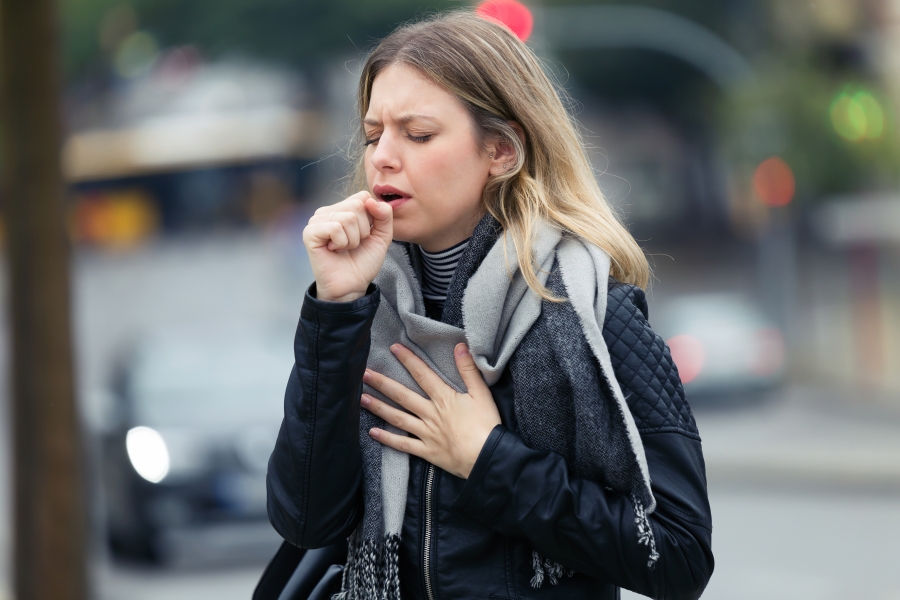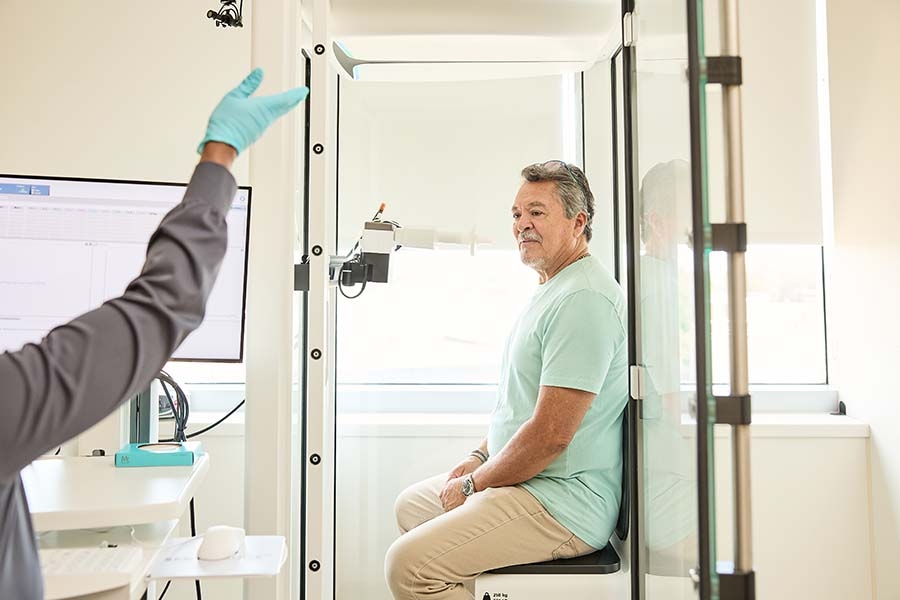When you have a chronic condition like chronic obstructive pulmonary disease (COPD), not being able to breathe can make you feel anxious.
I'm a clinical psychologist at Temple University Hospital. During difficult times, it's important to remember you're not alone. Here, I share insights on the connection between COPD and anxiety and what you can do to ease your worries.
While the anxiety you may be feeling is completely understandable, there are things you can do to manage your feelings.
Jump to:
- What is anxiety?
- How do you know if you have a problem with anxiety?
- Does COPD cause anxiety?
- Are there ways to calm anxiety related to COPD?
- Find support
What is anxiety?
Anxiety is a natural part of the body's alert system. It's a signal that something stressful is happening. Sometimes anxiety is caused by worrisome or fearful thoughts in your head. Other times anxiety happens as the result of an external event that you feel you have no control over, such as having a chronic condition or experiencing a traumatic event.
People with COPD often develop anxiety when their disease first develops, and they begin to experience increased shortness of breath. Not being able to breathe is usually an emergency and signals that something is wrong, so feeling anxious makes sense at this time.
However, once you find out you have COPD, your shortness of breath is not an emergency, it's your baseline. At this point, your anxiety can become a problem, limiting your functioning and getting in the way of things you want to do.
There are things you can do to learn to manage your anxiety. While anxiety usually subsides with time, it can become crippling but can be addressed with help.
How do you know if you have a problem with anxiety?
Anyone can experience anxiety. Situational anxiety can snowball and begin to develop into a bigger problem, or an anxiety disorder. Some people have always been anxious and may have anxiety disorders without much external stress.
There are a number of different types of anxiety disorders, but two of the most common are generalized anxiety disorder and panic disorder.
Generalized Anxiety Disorder
You may have generalized anxiety disorder if you have the following symptoms for 6 months or longer:
- Feeling restless, on edge or irritable
- Difficulty concentrating
- Uncontrolled worry or fear
- Sleep difficulty
Having a chronic condition like COPD can lead to excessive worry and fear, especially if your condition is advanced. Even without COPD, generalized anxiety disorder can cause problems in your everyday life, as ongoing feelings of fear affect your ability to function normally.
Panic Disorder
Panic disorder is associated with heightened episodes of anxiety called panic attacks. Symptoms of a panic attack include:
- Fast heart rate
- Sweating, trembling or shaking
- Feeling like you're going to choke
- Scattered thoughts
- Feeling out of control, like you're spinning
Panic attacks can come on unexpectedly or can occur as the result of a trigger, such as difficulty breathing that goes along with COPD. Because some panic disorder symptoms are similar to symptoms of COPD, it can be difficult to distinguish between a panic attack and a COPD flare-up. Often shortness of breath can lead to scary feelings and increased anxiety, and panic attacks can develop.
Does COPD cause anxiety?
There have been many studies that suggest a link between COPD and anxiety, but just how it happens is still not known.
It may be that symptoms such as cough, shortness of breath and chest tightness start a cycle of anxiety. You begin to feel anxious as COPD symptoms arise. As your heart rate quickens, you may start to think you can't catch your breath, so your feelings of anxiety increase, which makes your chest tight and your breathing to get worse.
Because some anxiety symptoms are similar to that of COPD, it can be difficult to tell if your symptoms are caused by your condition or by anxiety.
There are other factors that contribute to anxiety, including:
- Genetics
- History of trauma
- Inherent traits like shyness during childhood
Although we still have a lot to learn, there are treatments available, even with a chronic condition such as COPD.
Are there ways to calm anxiety related to COPD?
You've already taken some smart first steps by learning about anxiety and its connection to COPD. Knowledge and understanding will help you feel like you have control over your condition. It will also give you the tools you need to explore your own feelings of anxiety and figure out what works best for you when it happens.
Here are 7 additional actions you can take:
1. Recognize your triggers.
Now that you know about the symptoms associated with anxiety, pay attention to the triggers that happen before it occurs.
For example, if you start to feel anxious whenever you get short of breath from your COPD, you may identify that as one of your triggers. Knowing your triggers will help you reassure yourself before an anxiety attack happens.
2. Plan carefully.
Living with COPD requires planning and flexibility. You want to stay as active as possible, but you have to plan carefully:
- Make sure you use enough oxygen when exerting yourself.
- Slow down! Walk slowly rather than rushing to get a task over with as quickly as possible.
- Make sure there is a place to sit down along the way, putting a chair in the hallway or at the top of the stairs.
COPD is notoriously variable — some days are just better than others. Try to do your most difficult tasks on good days. Whenever you're leaving the house, make sure you know how far you will have to walk and take enough oxygen with you.
3. Interpret your symptoms.
Once you start to feel short of breath, what you tell yourself about those symptoms is important. If you start to think, “Oh no, I really can't breathe, I can't get enough air, I'm going to stop breathing,” then this will only serve to increase your anxiety and, as a result, make your breathing worse.
You want to try to keep your anxiety down so your breathing has a chance to recover faster. Make a conscious decision to use positive, helpful thoughts when you get short of breath: “I was exerting myself, I need to rest and I'll be fine.”
4. Use pursed lip breathing.
If you have COPD, you may already be familiar with pursed lip breathing. Breathing slowly in through your nose and out through your mouth is a basic technique used to slow your breathing down and avoid hyperventilating.
There are many other breathing techniques advocated for relaxation, but these should be used with caution because they make you focus on your breathing and may increase anxiety.
For COPD patients, once you use positive thoughts and take care of yourself physically by resting and using pursed lip breathing, the best thing you can do is distract yourself, or focus on anything but your breathing.
5. Distract yourself.
Although it sounds ridiculous, once you have interpreted your symptoms in a positive way and are resting, you need to distract yourself to keep anxiety at bay and to give your breathing a chance to recover.
In order to do this, you should address your shortness of breath and anxiety when it first starts. If you wait until you're having a full-blown panic attack, you will not be able to focus on anything else.
Once you're resting, try to distract yourself:
- Play a game on your phone, watch television, pray or count to 100.
- Visual imagery can be helpful — picture yourself in one of your favorite places, the beach, a mountain retreat or even your kitchen.
- Then go through your 5 senses — what would I see, hear, smell, feel and taste in that setting?
These activities may give you enough concentration to take your mind off your nervousness and allow your breathing to improve.
6. Practice mindfulness techniques.
Mindfulness simply means being aware. Mindfulness techniques help you reset your mind so your focus moves away from the source of stress.
When you start to experience racing or worrisome thoughts, focus your mind on a simple mental task. This might mean counting to 99 using only odd numbers or sitting down to map out your healthy meal plans for the week.
7. Attend a virtual support group.
Connect with others who are living with COPD by attending a support group, such as our COPD Better Breathers. By talking it out with someone who understands, you can start to feel like you have control over your anxiety, instead of the other way around. If you’re not comfortable with sharing in a group setting, then try calling a friend.
Talk to Your Doctor
Even during difficult times, it's important to remind yourself that feelings of anxiety and panic do pass. And you don't have to manage it all on your own.
Stay in touch with your care team. Your doctor may be able to prescribe medication, or refer you to a psychologist who can help you with techniques such as biofeedback and cognitive behavior therapy. Anxiety and COPD may go hand in hand, but anxiety can be managed successfully with help.

